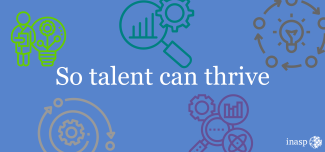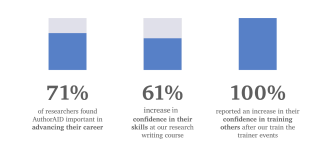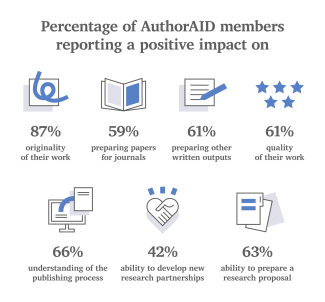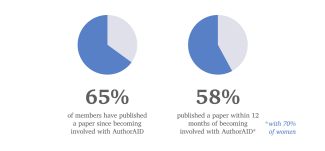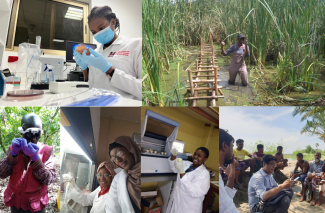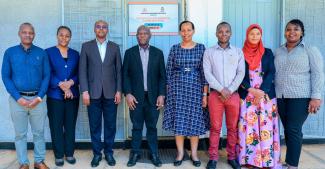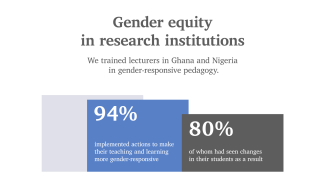A word from Louise Shaxson, Chair of the Board
On behalf of the Board I am delighted to introduce INASP’s 2023 Annual Review.
I’d like to begin by thanking John Young, who stepped down as Executive Director at the end of 2023, for leading the organisation with a clear strategic vision, wisdom and empathy over the past five and a half years. John has made a series of hugely important contributions to the field of international research in his long career, first at ODI and then at INASP. We wish him all the best and are very pleased that he will remain part of the team as an INASP Associate. But I’m delighted that Jon Harle agreed to take over as INASP’s new Executive Director in a world that seems to be changing ever more rapidly.
Towards the end of last year we entered the age of AI, and I’m very proud of the way INASP has responded by amplifying the work of our growing team of Associates and harnessing AI for equitable learning across the Global South. We’re only at the beginning of being able to understand the potential of artificial intelligence, but the AuthorAID community has been very active in discussions about how to illuminate the potential of large language models (LLMs) to empower early career researchers.
The speed at which AuthorAID members are able to support one another and uncover new ways of using LLMs has been extraordinary. If you want to see efforts to democratise the use of AI by improving its accessibility, look no further than the AuthorAID community’s focus on building equitable learning opportunities for all early career researchers, no matter who they are and no matter which institution they come from.
In the coming year we will be focusing on ensuring that the use of LLMs and other AI-enabled technologies are fully aligned with the highly-regarded principles of gender-responsive pedagogy we developed in our Transforming Employability for Social Change in East Africa programme. And we want to ensure that it’s not just universities who benefit: TVET institutions are critical for the development of green skills, and we are committed to growing our community towards those institutions, understanding their particular needs and how they can best take advantages of the opportunities presented by AI-enabled learning.
We will also maintain our focus on open access publishing to ensure that this learning can be shared. Because INASP is all about equitable learning, equitable access to knowledge, and creating the learning ecosystems which foster that equity.
I am very proud to be part of the INASP family and to work alongside highly professional colleagues committed to addressing barriers and improving opportunities for Global Southern early career men and women researchers to develop their potential and for their research to inform public debates and decisions in their countries, making a unique contribution to shaping more equitable research and knowledge systems globally.
Leandro Echt, political scientist, INASP Associate, Argentina/USA
A word from Jon Harle, Executive Director
Committed to supporting genuine change, we continued to balance a deep belief in the intrinsic value of research and learning, with an impatience for knowledge to make a real difference in the world.
In 2023 we equipped researchers and educators with the confidence, capabilities and connections to thrive and progress their careers: so they can generate the knowledge and evidence that their communities and nations need, and create the powerful learning experiences that will enable young people to secure meaningful work and make their own way in the world.
As access to generative AI began to grow, we were both cautious – about the perils of tech-driven change in education – and bold, recognising the imperative to not just discuss AI but to ensure that Southern researchers and educators were positioned to do so.
We are proud to have assisted over 10,000 learners last year, but the stories and statistics from our community show that our learning programme isn’t just equipping researchers with new knowledge, it is enabling them to navigate careers and connect a passion for science with a drive to serve their communities.
And reports from our colleagues in Uganda and Tanzania have also demonstrated that the change we seeded together in recent years continues to bear fruit, is rooting deeper in their institutions, and is now providing a foundation for us to support educators in West Africa.
In parallel, we’ve been steadily evolving how we do this work: our Associates team has grown, part of our progressive shift South, and the AuthorAID community is increasingly led and managed by its stewards and facilitators and driven by its members. Well into 2024, our courses, learning sessions and discussion groups are already humming with activity, and we’re excitedly advancing a series of new partnerships that will enable more educators and researchers to create change in, with and for their communities.
We can achieve much more together – get in touch if you share our ambitions.
In 2023, INASP's growth has been pivotal in shaping the research landscape within emerging economies, notably enhancing the visibility and accessibility of critical research through AuthorAID.
Felix Emeka, research and data scientist, INASP Associate, Nigeria
Harnessing AI to support the development of equitable knowledge systems
AI has firmly planted its roots in our reality, and at INASP, we're diving deep into how it can transform the research and academic landscapes in the Global South. These changes have profound implications for our projects, ushering in a new era of innovation and collaboration that we're just beginning to navigate. You can read more in our blog post to learn about our current journey of rapid learning and embracing AI's advancements together.
Where some saw uncertainty, we saw immense opportunities for fostering development and equity through our initiatives. To share this vision, we organised two events dedicated to unraveling the capabilities, opportunities, and challenges of AI.
We were privileged to have INASP Associate Kendi Muchungi from Kenya lead a hands-on demonstration that brilliantly illuminated AI's potential in education. This session was not just about showcasing technology but about illustrating how AI can enrich educational practices and research methodologies in the Global South, benefiting both students and professors overwhelmed by large classes and extensive duties.
Following this, our second event centred on how AI could empower early career researchers in East Africa. With the guidance of AuthorAID steward Nafisa Elehamer we explored how cutting-edge technologies could bolster academic and research careers, especially in settings where resources are scarce.
At INASP, understanding and utilising new technologies is fundamental to our mission of closing the knowledge gap and empowering educators and researchers in the Global South. By promoting a culture of learning and innovation, we strive to make the advantages of AI and other technologies accessible.
INASP, through AuthorAID, plays a pivotal role in nurturing the professional growth of early-career researchers worldwide, especially for low-and middle income country researchers. AuthorAID empowers researchers with the essential skills and knowledge required to excel in their fields through its diverse array of capacity-building initiatives, including webinars and online resources. By fostering a supportive community of peers and mentors, AuthorAID enhances research productivity and cultivates a culture of collaboration and knowledge sharing. Its unwavering dedication to promoting equitable access to research opportunities underscores its significance in advancing scientific inquiry and fostering inclusive scholarly communities.
Buna Bhandari, Assistant Professor of Epidemiology, INASP Associate, Nepal
A year of empowering global south researchers for impactful SDG contributions
In 2023, we made strides in empowering researchers from the Global South, providing them with guidance, support, and the essential tools to enhance their skills and confidence.
Read this blog post to learn more about AuthorAID's impact last year.
One of the most significant impacts of the AuthorAID Nigeria hub lies in its provision of valuable training and capacity-building opportunities. Through workshops, webinars, and mentorship programs, the hub equips early career researchers with essential skills needed in their research careers. The hub serves as a vibrant platform for networking and collaboration, facilitating meaningful connections among researchers from diverse backgrounds and disciplines.
Funmilayo Doherty, Chief Lecturer at Yaba College of Technology, INASP Associate, Nigeria
Empowering Future Leaders: The Journey of TESCEA in East Africa
The Transforming Employability for Social Change in East Africa (TESCEA) initiative continues to show lasting impact at the participating universities. TESCEA fosters a collaborative ecosystem, uniting universities, industries, communities, and governments in a collective mission to redefine the learning experiences for women and men students.
Our collaborative efforts with partners in Tanzania, Uganda, and Kenya have formed a scalable educational model through TESCEA's inaugural phase. This model is designed to cultivate graduates equipped with the essential critical thinking and problem-solving skills required to navigate and remedy real-world issues. Dive deeper into the transformative outcomes and learnings from TESCEA.
As the first phase of TESCEA concluded, the seeds of change it planted continue to flourish across partner universities. Gulu University in Uganda, for instance, has embraced the TESCEA approach to rejuvenate its Public Health masters and undergraduate law programs, even introducing a new postgraduate law program. TESCEA-trained lecturers are leading the charge in gender-responsive pedagogy workshops, weaving gender considerations seamlessly into education.
We came to realize that our education students who became teachers, or those who went for internships, apply these TESCEA approaches themselves and many of them have become very marketable in the schools where they interned. Many of them have been retained, and they’re doing well, based on what we know from the staff monitoring them.
Albert Luswata, Uganda Martyrs University, Uganda
Mzumbe University in Tanzania have opened their new Centre of Excellence for Teaching and Learning Innovation, built on the foundation of TESCEA's success. Initiated and advocated for by TESCEA team members, this centre will provide students with high quality teaching, quality of course content and more industry-relevant programmes, firmly anchoring the TESCEA approach in the university's structure.
Together with the TESCEA partners, we are now aiming to deepen the impact and to scale the TESCEA model. Our vision is to reach more lecturers and institutions in more countries, integrating TVET institutions, piloting the use of technologies such as AI, and leveraging resources for youth business creation. In particular, we are also looking to integrate green skills into our approach, ensuring that graduates and professionals enter the labour market ready to address climate issues in their communities and globally.
Bridging the Gender Gap in Higher Education: Innovations and Impact in Africa
Worldwide, the enrolment of women in higher education surpasses that of young men, with 111 women for every 100 men. Despite this global average, women's participation in higher education remains a pressing issue in various regions, notably in Africa where the landscape is starkly different. Here, higher education institutions see a mere 72 women enrolling for every 100 men, illustrating a significant gender gap in a predominantly male-dominated arena.
The focus on enrolment numbers only scratches the surface of the challenges women face in higher education. Their learning journey, academic progression, and future job prospects are deeply influenced by their classroom experiences. Enhancing these experiences necessitates a gender-responsive approach in the planning and delivery of education, tailored to meet the distinct needs of both men and women learners. However, the bulk of research and initiatives on gender-responsive pedagogy has traditionally been aimed at education systems in the Global North or at the primary and secondary education levels. Recognising this gap, INASP and our partners pioneered a novel approach to foster gender-responsive pedagogy within higher education institutions through the Transforming Employability for Social Change in East Africa (TESCEA) project.
The impact of the TESCEA project has been substantial: 307 lecturers trained, 186 courses redesigned, over 3,650 students impacted, and a vibrant community of 30 expert facilitators established in Tanzania and Uganda. Our initiative has changed teaching by integrating gender considerations into every facet of education, including lecturing, curriculum design, assessments, and mentorship.
Our efforts have culminated in the development of a framework to support gender-responsive pedagogy, particularly designed for higher education institutions in regions with limited resources or infrastructure. This framework empowers lecturers and their students to evolve into gender-responsive professionals. This framework has now also been adapted to an online learning environment, enabling designers and facilitators of online learning to be gender responsive. Click here to access the framework, case studies, and a comprehensive matrix that walks you through the integration of gender into every aspect of your learning design, step by step.
Building on our achievements, we extended our training in gender-responsive pedagogy to lecturers in Ghana and Nigeria across 2022 and 2023, marking another milestone in our journey to transform higher education into a more inclusive and equitable space for all genders.
Under the recently concluded Global Platforms for Equitable Knowledge Ecosystems (GPEKE) project, INASP partnered with the Ethiopian Academy of Sciences and the Uganda National Council for Science and Technology to establish national networks of women and men academics to address gender inequity in research. Between 2019 and 2022, the GPEKE partners, including INASP, facilitated workshops in Ethiopia and Uganda to create awareness of gender-related inequities in research and discuss what could be done to address these. At the end of 2023, we caught up with our partners, who told us about the evidence of GPEKE's impact they have observed: within the universities and institutions that took part, a tangible shift in behaviours and attitudes towards gender is noticeable. This is also reflected in structures and policy changes, pushing for positive change.
We all understand it’s not only about promoting women, but it’s creating that equality. But consistently fighting those hidden bottlenecks, and those hidden glass ceilings that are always there facing them. And the key term now: gender sensitive, but also gender responsive.” (Busitema University, Uganda)
2023 publications
We've also strived to document what we've learnt and share that with our wider community and the sector as a whole - dig into the following for toolkits, data, learning and reflections on enabling change in research and higher education globally:
An equitable knowledge ecosystem must include the voices of women and men
Voices of Early Career Researchers Data Report
Digital approaches to learning and capacity development – our open access book
Collaboratively reimagining teaching and learning - chapter in book "Higher Education for Good"
Leveraging AI to advance early career research in East Africa: a strategic dialogue
Exploring the potential of AI for teaching and learning in East Africa
Addressing gender disparities to create a more equitable knowledge system in Ethiopia
Creating a more equitable research system: lessons from Uganda
Enabling Equitable Knowledge Ecosystems in Africa and Asia
Digital learning is no panacea, but there’s a lot it can do - University World News
Navigating challenges and aspirations: how to support early-career researchers - International Science Council blog
The Urgent Need to Reform Research Publishing: A Call to the G20 - Center for Global Development blog
Partners are needed to meet the demand for mentoring at scale - University World News
Opinion: East Africa won’t secure its future without equipping its graduates to thrive - Africa.com
As former editor of the AuthorAID blog, I am really pleased that our blog has significantly matured and blossomed, to the extent that we now receive many high-quality, insightful and practical submissions from across the INASP countries—and much beyond. This is a genuine success story showing that engagement and mutual respect allows talent to prosper, irrespective of where it is located, to the increased benefit of all.
Richard de Grijs, Professor of Astrophysics, INASP Associate, Australia
We hope you've enjoyed reading our 2023 review. If the insights here have inspired you, and you see opportunities to collaborate, we'd love to hear from you.

